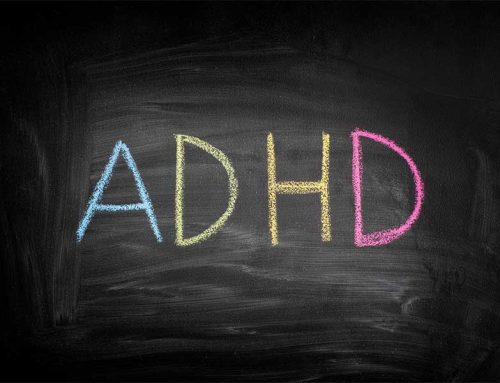Attention deficit hyperactivity disorder, or ADHD for short, is a disorder in which the brain develops differently. This leads to issues with attention and/or hyperactivity and impulsiveness. Alongside these ‘core’ symptoms of ADHD exist a range of co-existing conditions which are present in people with ADHD more often than they are in the general population. Examples include mood disorders, anxiety disorders and eating disorders.
Two of the commonly co-existing issues that people with ADHD have are developmental coordination disorder (DCD), commonly known as dyspraxia, and dyslexia.
Developmental coordination disorder
DCD is a condition that affects physical coordination. What this means is that the selection, timing and spatial awareness of activity-based movements and coordination are affected. In the general population, DCD affects up to 6 – 10% of the population, with up to 2% severely affected.
DCD is often first picked up in children. The early developmental milestones measured in very young children, such as crawling, walking and dressing, may be delayed in DCD. Despite this, the condition is not usually diagnosed in children under five, largely due to the very different rates at which children develop. As children grow, other activities like drawing, writing and playing sports can also be noticeably affected, putting children with dyspraxia ‘behind’ their peers in developmental terms.
In adults, especially those who have managed to improve their coordination, DCD often causes issues more related to the cognitive or ‘thinking’ aspects of dyspraxia. These can include difficulty structuring information, poor organisational skills and timekeeping, and sometimes even limited social skills. In adults who have not managed to improve their coordination, dyspraxia can make them appear to move clumsily.
Dyslexia
Dyslexia is a difficulty in learning to read aloud and spell. Like ADHD, dyslexia is a neurodevelopment disorder caused by the brain developing differently. Although dyslexia was first described over a hundred years ago, it is relatively recently that our understanding of dyslexia has improved.
Dyslexia is best thought of as a continuum, as opposed to a distinct category, as there are no clear cut-off points for diagnosis. Dyslexia has three key elements: word reading accuracy, reading rate, and fluency and reading comprehension. Additionally, when writing, spelling accuracy, grammar and punctuation accuracy, and clarity and organisation of written expression can be affected.
There are, however, positives to how some dyslexic people think. Some dyslexic people can show strengths in reasoning and in visual and creative fields.
ADHD and DCD/dyslexia
There is a significant overlap between ADHD and both DCD and dyslexia. Studies looking at DCD in people with ADHD have reported that as many as 89% of people with ADHD also have DCD. When looking at populations with DCD, around 50% of people with DCD also have ADHD.
For dyslexia, between 18–45% of people with ADHD also have dyslexia, whilst 18–42% of people with dyslexia also meet the criteria for ADHD.
It is, therefore, very clear that these conditions commonly co-exist, making life more complicated for those in which they occur.
Impacts on daily life
Beyond issues with coordination, DCD can cause issues with many areas of daily living; these issues include dressing or preparing meals, learning new things, remembering information, time management and organisation skills and social situations. In many cases, this causes significant issues with daily life
Dyslexia can also have a significant impact on daily life, affecting memory, organisation, time-keeping, concentration, multi-tasking and communication.
In people with ADHD, these issues are often compounded, making coping with life more challenging.
Strategies to manage, resources, signposting etc
Whilst there are no cures for DCD, dyslexia or ADHD, there are therapies that can help with daily living. For DCD these include:
- occupational therapy – helping to find practical ways to manage everyday tasks such as writing or preparing food.
- cognitive behavioural therapy (CBT) – a talking therapy that can help change the way you think and behave.
For children with dyslexia, extra educational support from their school should be made available, and with appropriate support, many children can attend mainstream schools.
Support that may help children with dyslexia includes:
- lessons in small groups with a specialist teacher
- phonics (a way of teaching children to identify and process the smaller sounds that make up words)
- technology like computers and speech-recognition software
For adults with dyslexia, employers are required to make reasonable adjustments to the workplace, such as allowing extra time for certain tasks. With support, people with ADHD and dyslexia or DCD can live successful, happy lives.
There are many excellent resources and support for people with DCD or dyslexia, including the British Dyslexia Society and the Dyspraxia Foundation.






Please stop referring to adhd and dyslexia as disorders. They are different from the norm. A disorder is stigmatising. A difference is not. Adhd is not always a deficit either. Hyperfocus is the opposite.
Hi Caroline – Thank you for your comment. Whilst many people dislike the term ‘disorder’, it is for now the agreed medical nomenclature, so for clarity we use that term.
I can understand why people don’t like the term ‘disorder’ but Russell Barkley described the term in a way that made sense to me. He said that the term ‘disorder’ is used when the symptoms are causing impairments to the individual’s life. ‘Disorder begins where impairment begins’. When people see the list of symptoms for ADHD, they often say ‘I get a bit like that sometimes’. Whilst that is hurtful for those of us who have had major life adversity due to these symptoms… what they’re saying is kind of true. The key word is ‘sometimes’… and yes, everyone experiences our symptoms ‘sometimes’ but for us it’s a lifelong daily struggle and we need help to manage it… and that is impairing and we deserve a chance to live a full life just like everyone else.
I think perhaps, especially now, as clinical names of conditions are in the public consciousness it would be good for the public to know what some are called: condition, disease, syndrome, phenomenon or disorder. I have Inflammatory Bowel DISEASE, Raynaud’s PHENOMENON, Joint Hypermobility SYNDROME and Hyperactive Attention Deficit DISORDER.
I do agree with Caroline about ‘Attention Deficit’ being misleading and inaccurate. It’s not a deficit of attention but an inability to regulate attention accordingly hence us ADHDers can either be so hyperfocussed we forget to pee or unable to settle down to anything. ADHD is a condition that constantly contradicts itself. It’s like the only thing consistent about my is my inconsistency.
I was hoping to solve an inquiry since in the UK my father cannot be diagnosed for both adhd and dyslexia because they’re too similar. Does that stop the possibility of having both? Or does it mean it’s harder to detect because of it. Thus was based on new research that I cannot seem to find according to the doctors, as a professional please let me know what it is
Hi Theo – Regrettably, our website blog is managed by Psychiatry-UK’s Communications Team, and we are unable to offer clinical advice. However, as our article suggests, there is a range of co-existing conditions that are often present alongside the core symptoms of ADHD. Dyslexia is one example. Our ADHD assessments strictly adhere to DSM-5 criteria for the diagnosis of ADHD. Due to the limited time frame of these assessments, there is little time to discuss co-existing conditions. You might find it useful to visit the British Dyslexia Association website, where you will find advice regarding the assessment of dyslexia.